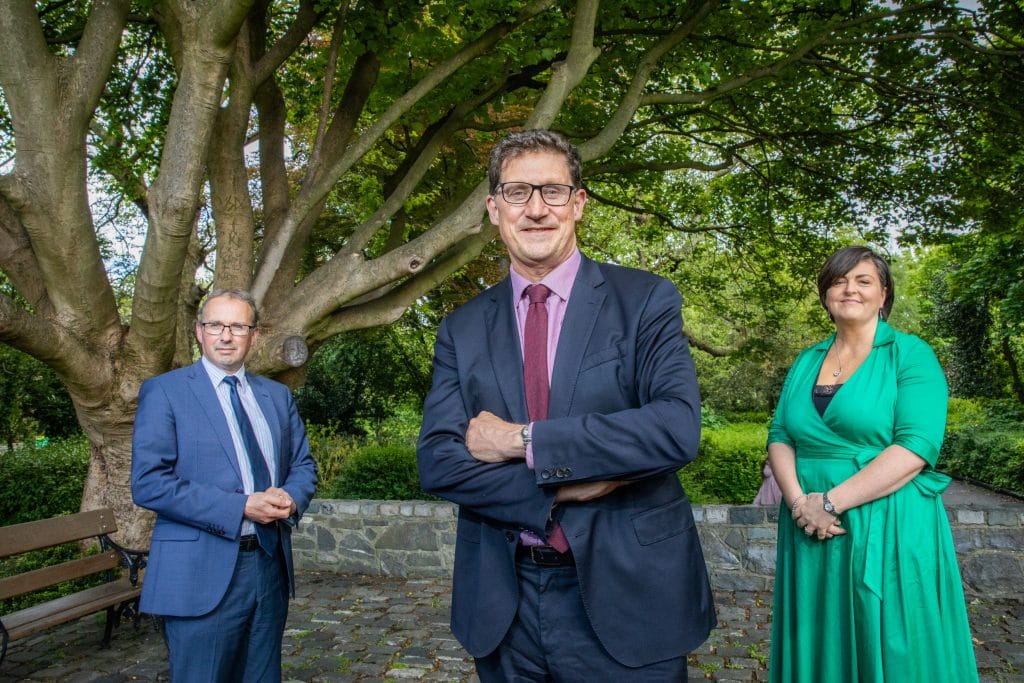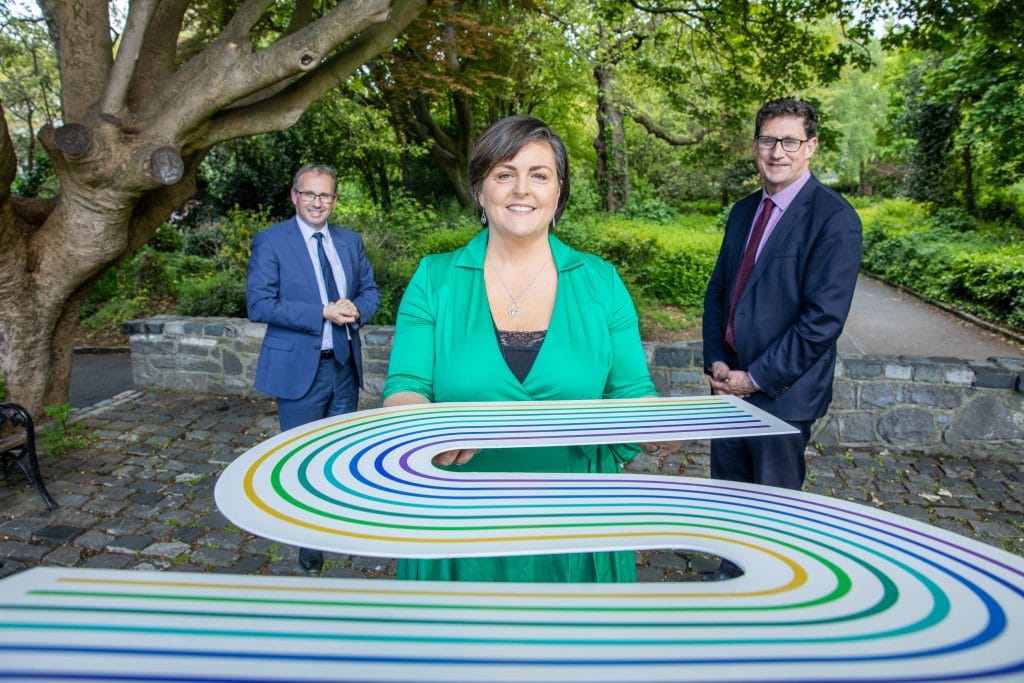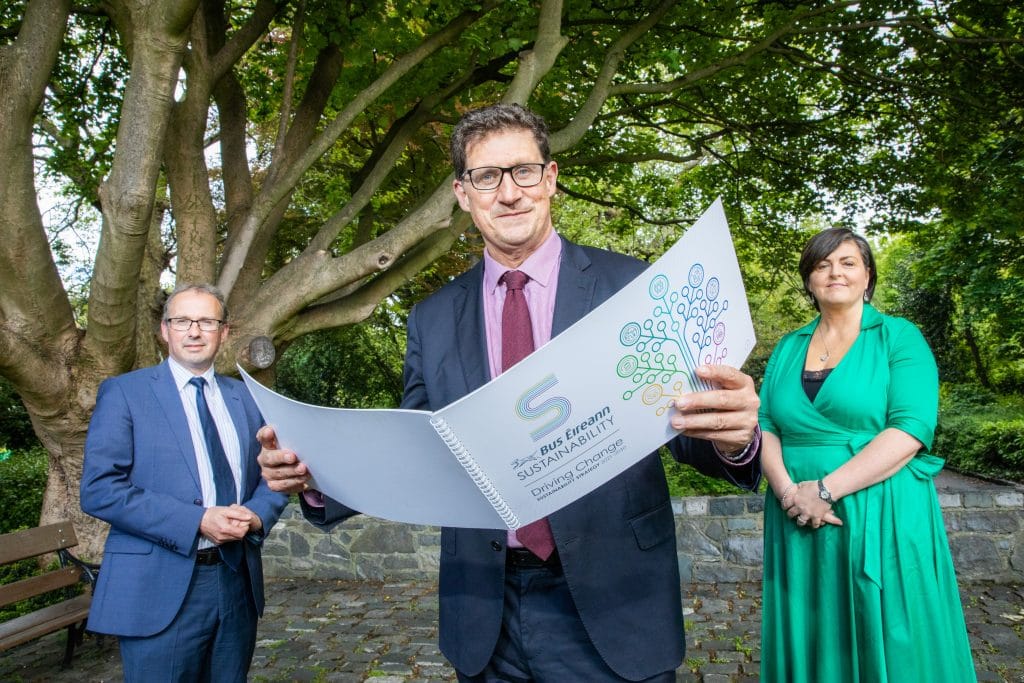Bus Éireann is committing to cut total greenhouse gas emissions by 50% by 2030, while also growing passenger numbers, including school transport, to 116 million a year. At the launch of the strategy Transport Minister Eamon Ryan TD said: “Our bus services play an essential role in connecting our communities, I’m impressed by the ambition laid out in Bus Éireann’s new strategy and fully support their plans. Better and more frequent services will benefit public transport users and provide an attractive alternative to those frequently travelling by car. This strategy will also help us meet our climate commitments; achieving a 50% electric-powered bus fleet by 2030, and increasing the number of people who choose public transport, will help us transform how we travel in Ireland.”
What makes the plan is impressive is the clear commitment on reaching specific targets to achieve the improvement and reduce the companies carbon footprint:
· Bus Éireann is to replace half its fleet with electric and hydrogen powered vehicles over the next nine years as part of a plan to slash greenhouse gas emissions.
· The company looks to a 30% increase in passenger numbers over the period of the plan insisting that it can handle growth while still reducing emissions.
· Expanding the school bus scheme is one area that Bus Éireann stated can help get people from their cars to the bus. One in seven school-goers travels by school bus and the company is aiming for a 20% increase. School transport could reduce car journeys by 35,000 a day, and emissions per bus passenger kilometre are around five times less in buses than in private cars, even in the current diesel models

Stephen Kent, Chief Executive Officer, Bus Éireann said: “We are very conscious that in setting these targets, we are committing Bus Éireann to very positive but profound transformation. The customer experience is the fleet, and we will move from having 1,100 diesel-fuelled buses and coaches on the road, to half of those being zero emission in the next nine years, to align with and enable the plans outlined by Government, while the foundations of the plans are built on emmision reduction there are other aspect to it. Because Bus Éireann operates a very extensive and varied public transport network, we need a range of solutions. This year, funded and supported by the National Transport Authority, we will deploy 61 hybrid buses, beginning in Galway, three hydrogen-fuelled buses for Dublin commuter routes and the tender is live to source battery electric vehicles for the Athlone town service. This will positively impact not only emissions but also air quality in urban areas.”
Reducing the impact a company like Bus Eireann has on the environment is as much about commitment by the staff and management, as it is about financial investment and will according to the CEO, be complex. He said: “The factors to enable this change are perhaps less visible but mean enormous adaptation within the company. We are assessing the implications for the locations and power supplies of all of our depots. Hydrogen fuel cell technology is nascent in Ireland and its development must also be factored in.”

Bus Éireann operated the first trial of a hydrogen bus in public service in Ireland last year and hydrogen has many advantages for longer-distance routes.
Bus Éireann’s sustainability strategy was developed in the context of national and European policy including the Climate Action Plan, the National Clean Air Strategy, the EU Clean Vehicles Directive, the Waste Action Plan for a Circular Economy, the Department of Transport’s work on sustainable transport policy, Project 2040 and the National Planning Framework, as well as the CIÉ Group sustainability strategy.
There are other aspects to the plan that will also improve the passenger experience while also improving sustainability. Other initiatives include an energy efficiency programme, sustainable procurement strategy and a new waste management plan with the aim of reducing waste by 50% over the next nine years, with 75% of all waste produced recycled. The company is intending to have five times as many female supervisors, and full gender balance at board level.
· Bus Eireann emitted 80,000 tonnes of carbon dioxide in 2019 and aims to halve that by 2030.
· It also handled 800 tonnes of rubbish and is aiming to cut that in half and recycle 70% of the remainder.
· An increase in the number of women drivers, who currently number 73 out of 1,920
· All buses, stations and main stops fully accessible.
Bus Éireann has established a Board Sustainability Committee, which met for the first time in April. Bus Éireann has recently achieved a B rating accreditation by the Climate Disclosures Project, for taking co-ordinated action on climate issues, and has joined the Business in the Community network. Overseeing the plan is Rory Leahy who has been appointed Chief Safety & Sustainability Officer. He is confident of a move to public transport by young people in particular and is also confident that while there will be a substantial transfer of students from the car to the bus over the nine year period, there will also be some organic growth. Asked about what way fares will go for the traveling public he explained that fares were a matter for the National Transport Authority on direct award contracts and the Department of Education on school transport contracts. In terms of its Expressway services, market forces would decide, but fares will have to be attractive to customers.
Summiming up CEO Stephen Kent said: “From our customer perspective, we want to make bus travel the first choice especially for people living in towns and cities. Right now, bus and coach travel is inherently more sustainable as it emits up to one-fifth the carbon dioxide per passenger kilometre, compared to private cars. Due to ongoing improvements, modern diesel bus engines emit 90% less nitrous oxides than they did in 2000. In the towns and cities in which we operate, working in conjunction with the National Transport Authority with initiatives such as BusConnects, we will invest in our stations and provide a service that is 100% fully accessible and 100% emissions free. This is an exciting prospect and a huge incentive for everyone to think ‘bus’ ahead of ‘car’ in the coming years.”
Currently 79% of adult journeys outside of Dublin are by private car. The big enablers for Bus Éireann will be fleet, power, people, facilities and funding. The scale and urgency of this transformation will require ongoing close collaboration with the National Transport Authority, the Departments of Transport and Education, CIÉ, State bodies, Local Authorities, suppliers and local communities, and our employees, and we are grateful for their support,”
Driving Change the Bus Éireann Sustainability Strategy 2030 is available at www.buseireann.ie/Sustainability



